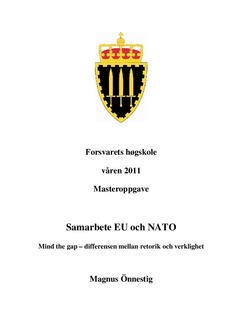Samarbete EU och NATO: mind the gap - differensen mellan retorik och verklighet
Master thesis
Permanent lenke
http://hdl.handle.net/11250/100024Utgivelsesdato
2011Metadata
Vis full innførselSamlinger
- Masteroppgaver [466]
Sammendrag
Cooperation EU and NATO: Mind the gap – the difference between rhetoric and reality. The purpose of this thesis is to analyze and, if possible, identify and explain what it is that hinder a deeper and smoother cooperation between the EU and NATO, and from the findings discuss how to enable a closer cooperation. This thesis examines security policy and military strategic cooperation between the EU and NATO regarding geopolitical burden-sharing, the “war” on terrorism and the use of rapid reaction forces. The three topics are analyzed through the perspectives of ends, means and ways with the aim to grasp the differences and similarities between the organizations. Thereafter the results of the analysis are explained based on the theories of realism and liberalism. Finally, conclusions are discussed in order to identify and explain what prevents a deeper and smoother cooperation between the EU and NATO, and from these obstacles derive who to enable closer cooperation. The study shows that the problems of cooperation need to be resolved at the highest level, and that the problems to cooperate can be explained mainly by realist theory. The EU-NATO Partnership’s main ambition must be to develop security policy cooperation, that minimize unnecessary duplication of resources, especially since there are a general lack of financial resources as well as military and civilian capabilities for international crisis management. The benefits of future, more efficient, security cooperation are thus primarily a question of military and civilian capabilities, rather than political power.
